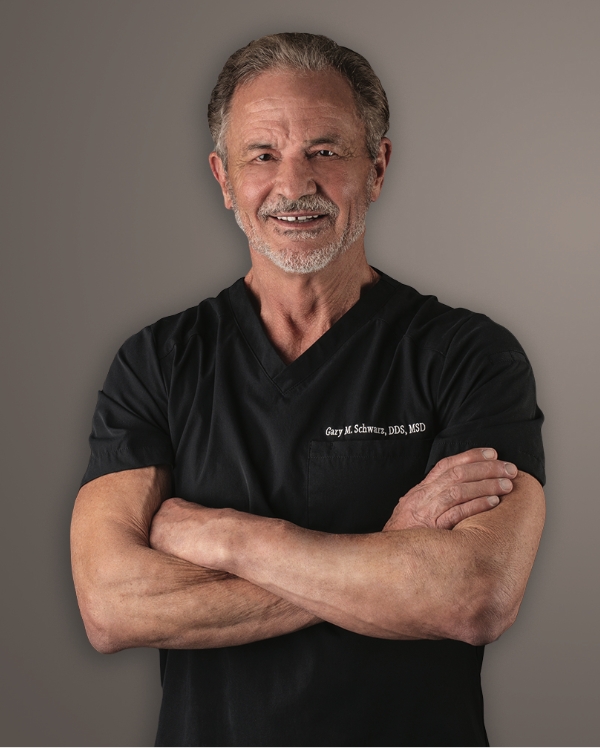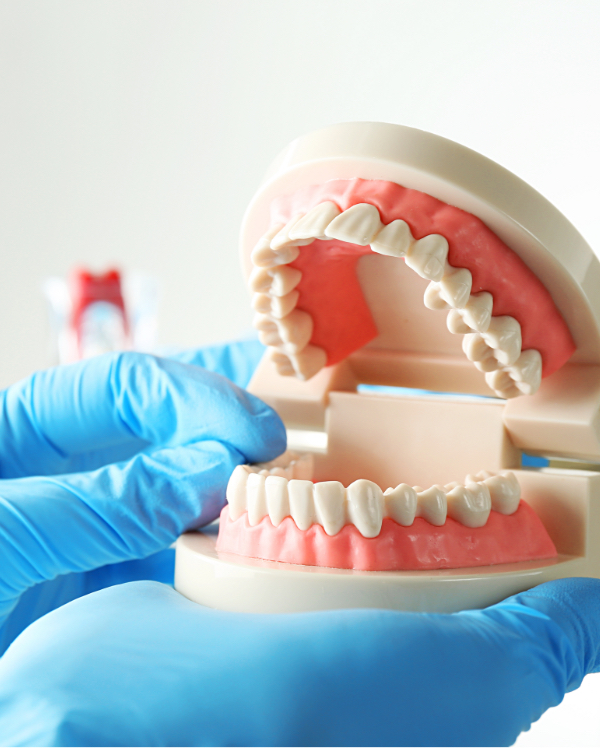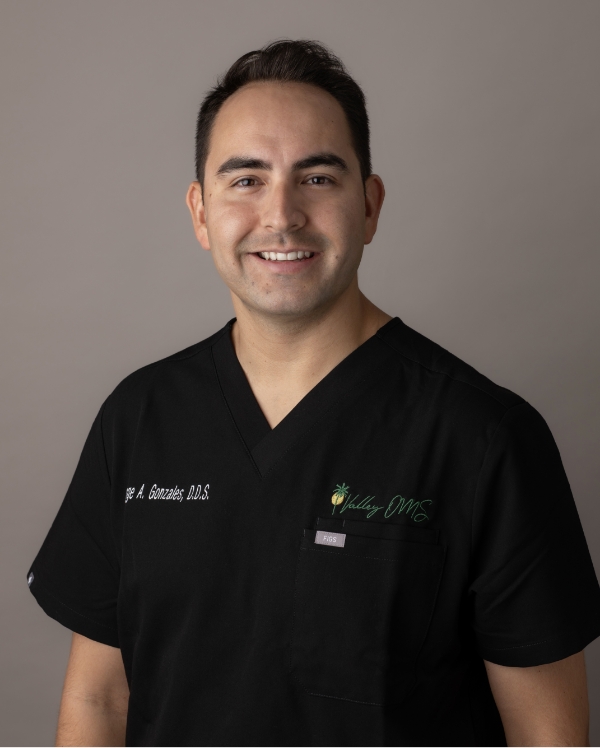
Millions of Americans suffer from tooth loss. This tooth loss is often the result of traumatic injury and damage and may also stem from disease, decay, or general dental neglect. No matter the cause of tooth loss, the effects can be debilitating, causing both aesthetic and functional impairment.
Fortunately, there are numerous options available to restore missing teeth after the extraction of unhealthy teeth. One of the most popular options is dental implants. At Valley OMS, a full-scope oral surgery practice, we are happy to provide dental implants to patients from across Texas. We welcome you to learn more about what dental implants are and how they can bring your smile back.
What are Dental Implants?
A dental implant is a small titanium post, which is placed into the jaw, where it fuses with the surrounding bone and tissue. Once securely in place, this titanium post functions as an artificial root, replacing the natural tooth root that was lost or extracted.
On top of the dental implant, your oral surgeon will place an abutment that will act as a connective piece. On top of that abutment, we can then secure a prosthesis, which may be a single crown or a complete bridge. The result is a new set of teeth that look and feel similar to your natural ones.
Dental implants are a popular option for tooth replacement because they tend to be more secure and comfortable than traditional dentures. In fact, once you have fully recovered from your dental implant procedure, you will likely be able to eat most of your favorite foods just like normal.
Different Types of Dental Implants
At Valley OMS, we provide a number of different options corresponding to varying levels of tooth loss. When you visit us for a one-on-one consultation with one of our providers, we will evaluate your needs and recommend the type of dental implant procedure that is right for you.
In the meantime, consider a few of the primary options.

Zygomatic Implants
Zygomatic implants are a little bit larger than conventional implants, which means that they require more careful placement; Valley OMS is one of the few practices in Texas that does this high-precision work. However, these implants can provide smile restoration for patients who have very little remaining bone matter and who may have been told that they are ineligible to receive implants at all.

All-on-4 Dental Implants
For those who are missing all of their teeth, All-on-4 is an outstanding option, allowing us to replace your entire smile with strategically placed implants. Because the procedure uses so few implants, it is often a relatively brief procedure with a comparatively short recovery time.
Other Dental Implant Options
Valley OMS is pleased to offer the following options:
- Crown on implant (for those missing a single tooth)
- Bridge on implant (for those missing several teeth)
- Full mouth implants (for those missing all of their teeth)
To find out more about the different types of dental implants or to ask which type might be best for you, we invite you to schedule a consultation with Valley OMS at any time.
Am I a Good Candidate for Dental Implants?
When you join us for a consultation, we will perform a physical examination of your teeth and also record your medical history. Based on this information, we will be able to verify whether you are a qualified candidate for a safe and successful dental implant procedure.
Generally speaking, the best candidates for dental implants meet the following criteria:
- They are missing one or more teeth, or they anticipate having teeth extracted.
- They do not have any untreated periodontal diseases.
- They are in good health overall, and they do not have any underlying conditions that would keep them from fully healing.
- They have taken the time to talk with an oral surgeon and have clear expectations about the procedure, the recovery, and the ultimate outcome.

They are missing one or more teeth, or they anticipate having teeth extracted.

They do not have any untreated periodontal diseases.

They are in good health overall, and they do not have any underlying conditions that would keep them from fully healing.

They have taken the time to talk with an oral surgeon and have clear expectations about the procedure, the recovery, and the ultimate outcome.
A good candidate will also require sufficient bone tissue into which the implants can be placed. However, even patients with inadequate bone mass may still qualify for treatment via bone grafting or the use of zygomatic implants.
Do I Really Need Dental Implants?
Most patients who have experienced tooth loss are eager to find out how they can restore their smile. For those who have just lost one or two teeth, however, is replacing these teeth really necessary?
Replacing missing teeth with dental implants can be beneficial for a few reasons. First and foremost, it can restore your teeth to their normal aesthetics and full functionality. Also, be aware that your jawbone requires constant stimulation, which it receives from the tooth roots. However, if you lose teeth, the bone no longer gets that stimulation, which can cause deterioration.
Leaving tooth loss unaddressed for a long time may result in unwanted changes to your facial appearance, in addition to making it more complicated to get implants down the road. The best thing you can do to avoid the loss of bone is to have missing teeth replaced sooner rather than later.
What are the Benefits of Dental Implants?
There are a number of advantages to replacing lost teeth with dental implants, among them:
- Once fully healed, your dental implants will look and behave just like naturally growing teeth.
- Dental implants typically last a lifetime, while the prostheses used can last ten years or more, making this is a durable solution to tooth loss.
- By stimulating the jaw, dental implants can help you avoid further bone loss and can help prevent adjoining teeth from becoming unstable.
- Dental implants can help you avoid gum disease by filling in gaps that might otherwise become traps for food particles and bacteria.
- Most patients find that dental implants are more comfortable and secure than dentures. You do not need to worry about removing them and can generally eat whatever you like.

Restore Lost Teeth with Dental Implants
When left untreated, tooth loss can result in additional complications, including the loss of bone tissue and the shifting of other teeth. If you have lost teeth or need a tooth extraction, we invite you to learn more about dental implants. Find out more about restoring lost teeth with this tooth-replacement option.
Why Choose Valley OMS for Your Dental Implants?
Valley OMS is truly a full-scope oral surgery practice, meaning we provide patients throughout Texas with solutions to help restore lost teeth, rehabilitate smiles, eliminate pain, and promote oral wellness. Our well-regarded providers will offer plenty of personal attention, helping you determine the best treatment options, whether that means implants or something else.
Additionally, our surgeons utilize techniques that are much less invasive than the norm. Patients prefer our less-invasive approach because it means safer and more comfortable procedures, improved results, and abbreviated recovery times.
Dental Implants: The Process
The specific process can vary from patient to patient, depending on the type of implants as well as your unique oral health needs. With that said, you can generally expect the following steps.
Consultation
During your initial appointment, we will perform a careful evaluation of your teeth and jaws and also take some dental images. Based on this information, we can develop a treatment plan that is right for you, all while ensuring that you are a qualified candidate for dental implants. If you decide to proceed with dental implants, we may also take some impression molds of your current teeth, which can be used to custom-tailor your dental prostheses.
Implant Placement
Generally, two separate procedures are required for dental implants. With the first procedure, the implants will be placed into the jawbone. Following placement, the implants will need to fuse into place with the surrounding bone and tissue, ensuring they are secure. This healing process can take anywhere from three to six months, and during this time, you will need to wear temporary prostheses and stick with a softer, gentler diet.
Restoration
Once the implants are snugly in place, an abutment will be placed on top of each one, followed by the crown, bridge, or full dental arch. Once your restorations are in place, you will have a full set of teeth that look and function like natural teeth.
Advances in Dental Implant Surgery
Thanks to recent advances in dental full-mouth implant procedures, Dr. Schwarz can place single-stage implants, meaning you can have your new teeth placed with just a single procedure instead of two. This speeds along the dental implant timeline considerably. We are happy to tell you more about this option and to let you know whether you are eligible for it.
Meet Your Oral Surgeons
Valley OMS have combined decades of experience performing dental implant procedures. And they are united by a shared commitment to clinical excellence, patient care, and a respectful practice environment. To learn more about us, we welcome you to read their individual bios or contact Valley OMS to schedule a consultation.
Will Insurance Cover My Dental Implants?
One of the most common questions we hear from our patients is whether their dental insurance will help offset the cost of implants.
Many dental plans will cover part of the cost of implants. Our office is here to address any questions about insurance and financing, and we welcome you to contact us any time.
Does Getting Dental Implants Hurt?
At Valley OMS, we are committed to patient comfort and wellbeing, and we offer several anesthesia options. We can help you determine the level of sedation that is best for you, ensuring you do not feel discomfort during the procedure.
While you can anticipate some tenderness or mild pain during the early days of your recovery, usually, over-the-counter pain medications may be used to alleviate this pain.
Additional Questions About Dental Implant Recovery
Before scheduling a dental implant procedure, patients will naturally want to know what they can expect from the recovery process.
-
How Long Will It Take to Recover?
Recovery takes anywhere from three to six months; during this time, your implants will fuse with the surrounding tissue, helping them to fit securely in place. When it comes to pain and swelling, most patients will begin to feel more or less back to normal within one to two weeks.
-
When Can I Eat Following my Dental Implant Procedure?
After you have your implants put into place, you will have gauze bandages covering the treated areas. We recommend leaving these in place for an hour or so to ensure that bleeding is under control. After that, you may grab something to eat or drink, though we advise starting off with soft foods as well as liquids. We would also advise against drinking from a straw for the first 48 hours following your dental implant procedure.
-
How Long Will My Dental Implants Last?
Dental implants are designed to be a long-lasting tooth replacement option. The artificial teeth may ultimately need to be replaced, though they should last for approximately ten years. Implant lifespan can be extended by taking care of basic oral hygiene, including brushing and flossing like normal and getting dental cleanings at least twice annually.
-
Are Dental Implants Right for Me?
If you have lost teeth or anticipate having teeth removed, it is important to consider your options for tooth replacement. For most of our patients, dental implants represent the most secure, comfortable, and satisfying option, allowing you to once again have a full set of healthy teeth that look and feel like normal.
We would love to tell you more about the benefits of dental implants, or answer any questions you may have about the procedure and recovery. To make an appointment, contact Valley OMS at your next opportunity.
Before and After
Get a better idea of what dental implants look like.
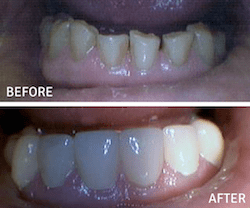
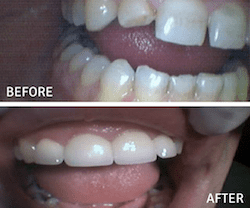
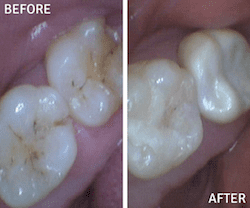
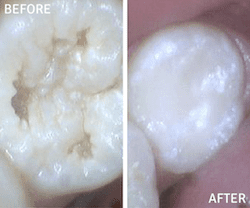
Schedule your dental implant consultation today by contacting any of our offices in Texas.



